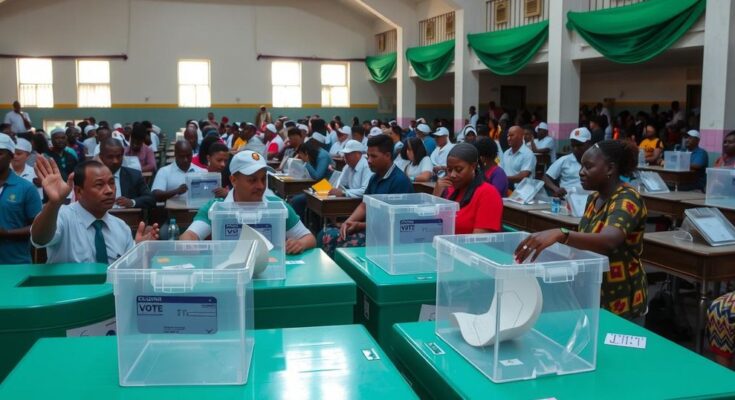Comoros conducted parliamentary elections on Sunday, which were boycotted by several opposition parties alleging authoritarianism and electoral fraud by President Azali Assoumani. Approximately 330,000 voters were registered, but turnout expectations were low due to discontent with political conditions. Past elections under Assoumani have been criticized for manipulation and repression.
The Comoros held parliamentary elections on Sunday amidst a boycott from certain opposition factions who accuse President Azali Assoumani and his ruling party of authoritarianism and potential electoral malpractice. This election will determine the composition of the legislature, with results anticipated next week. Approximately 330,000 of the 850,000 citizens on the islands are registered to vote, but opposition voices reported expectations of a low voter turnout, reflecting widespread dissatisfaction with the political process.
President Assoumani’s party, the Convention for the Renewal of the Comoros, had previously secured 20 out of 24 contested seats during the 2020 elections, which opposition members denounced as a sham. Assoumani exercised his right to vote on Sunday in Mitsoudjé, where he maintains strong political support. Recent elections, including one that saw Assoumani re-elected last year, have been marred by allegations of fraud and violent protests.
The Juwa Party, led by former President Ahmed Abdallah Sambi, was among the notable parties abstaining from voting. Comoros, an Indian Ocean archipelago, has a problematic history characterized by military coups since its independence from France in 1975. Azali Assoumani, a former military officer, has been a pivotal figure in this tumultuous political landscape since first taking power in 1999, returning to the presidency in 2016 while circumventing previous term limits established by constitutional amendments in 2018.
The Africa Center for Strategic Studies, a U.S. research institute, has characterized Assoumani’s extended rule as increasingly authoritarian, highlighting issues surrounding political repression and the lack of competitive elections. Despite adverse weather conditions posed by Tropical Cyclone Dikeledi, the electoral process proceeded on schedule in the region.
The Comoros is a small archipelago located in the Indian Ocean, consisting of three main islands. It became independent from France in 1975, but its political history has been marred by instability, including a series of military coups and conflicts. Azali Assoumani, who initially seized power in 1999, has dominated Comorian politics for decades, winning multiple elections while critics allege manipulation of democratic processes. Recent electoral cycles have been plagued by accusations of fraud and repression, prompting significant segments of the opposition to withdraw from participatory democracy.
In conclusion, the parliamentary elections in Comoros reflect the ongoing political turmoil and dissatisfaction among the populace regarding the country’s governance. The boycott by opposition parties signals a stark rejection of the electoral integrity under President Assoumani’s administration. With a history of tumultuous governance and claims of increasing authoritarianism, the political future remains uncertain for the Comoros as they navigate their democratic processes under challenging circumstances.
Original Source: apnews.com




